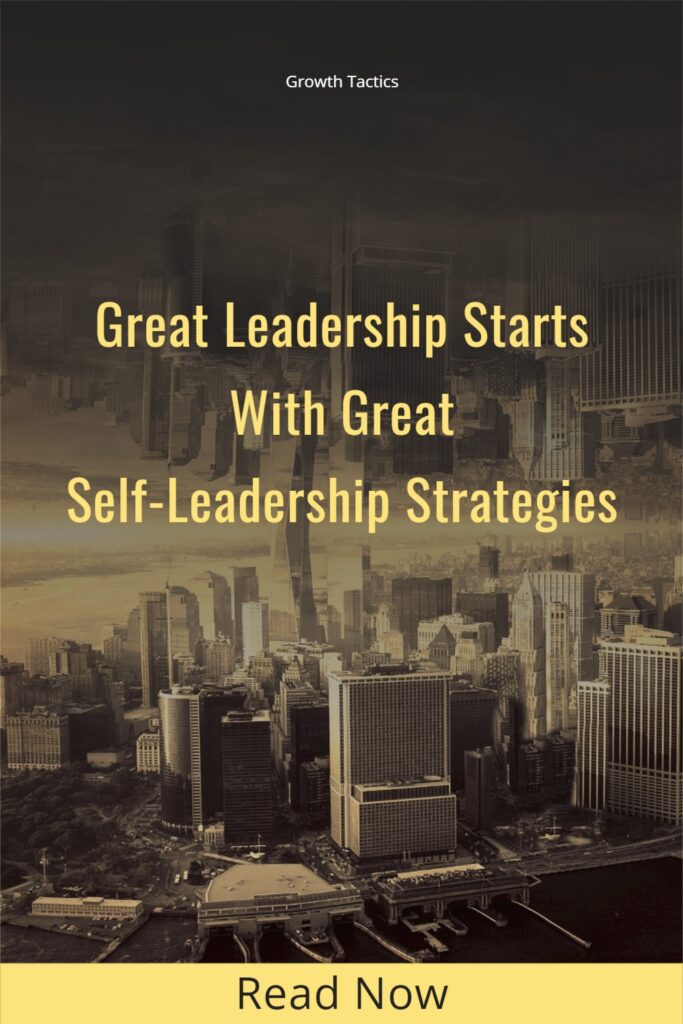Ready to unlock your leadership potential? It starts with you! Self-leadership strategies are your secret weapon for success.
Before you can guide others, you’ve got to master leading yourself. Think about it: you’re the role model, the trendsetter.
What you do speaks louder than words.
So, let’s discover how to set an example that truly inspires. Your journey to becoming a great leader begins right here, right now!
Jump To Section
What is Self-Leadership?
Self-leadership is a critical aspect of personal and professional development. It involves taking responsibility for your own growth and leading yourself toward success.
Self-leadership starts with self-awareness, which is the ability to recognize your emotions, thoughts, and behaviors. It’s essential to understand your strengths and weaknesses, your values, and your goals. This self-awareness helps you to make better decisions and take actions that align with your values and goals.
Confidence is another key element of self-leadership. It’s the belief in yourself and your abilities. When you are confident, you are more willing to take risks and try new things.
This mindset is essential in leadership because it encourages others to follow your lead. A lack of confidence can make it difficult to make decisions, take action, and inspire others.
As a leader, it’s essential to have your own life together before leading others. If you don’t take care of yourself first, you won’t be able to lead others effectively.
You must have the self-discipline to manage your time, prioritize your tasks, and work towards your goals. When you lead yourself well, you set an example for others to follow, and they will respect you for it.
Self-Leadership Strategies
Know Your Strengths and Weaknesses
“Unless you learn to face your own shadows, you will continue to see them in others, because the world outside you is only a reflection of the world inside you.”
Unknown
Ever wonder why some leaders seem to have it all figured out? Here’s their secret: they know themselves inside and out.
Think about it. You’re unique. You’ve got talents that make you shine and areas where you stumble. That’s not just okay, it’s human. We are all unique and have weaknesses.
As a leader, you need to know your strong suit. Are you a smooth talker? Use that gift to fire up your team. But maybe spreadsheets make your head spin. No worries! Find a numbers whiz to handle that.
Here’s the deal: knowing your weak spots isn’t about beating yourself up. It’s your ticket to growth. See a skill you need to polish? Go for it! Learn, practice, improve. That’s how you level up.
Remember when I first started leading teams? I was great at big ideas but terrible at details. Once I owned up to that, everything became easier. I brought in a detail-oriented partner and boom! We were unstoppable.
So, here’s your challenge: take a good, honest look at yourself. What makes you awesome? Where could you use some help? Use this knowledge to lead smarter, not harder.
Your path to becoming a rock-star leader starts with you. Embrace your strengths. Face your weaknesses. That’s how you’ll crush your goals and inspire others.
Engage in Self-Reflection

Self-reflection is vital when it comes to self-leadership. Many times we are so focused on everything we have going on in our lives that we forget to look inside ourselves. Take a few moments to analyze yourself.
Get a sheet of paper and write down your strengths and weaknesses. Be honest with yourself. Understanding what areas you are strong in and what areas you can improve is vital for getting the most out of your personal development efforts.
In the Air Force pilots reflect after every mission. This period of reflection is called a debrief. The pilot may fly a training mission that lasts less than an hour but after they land the real work begins in their debrief session.
These sessions of reflection can last anywhere from an hour up to four hours or more. During these sessions, pilots go over tapes of the flight and discuss what went right and what went wrong. This is a huge reason why Air Force pilots are so good at what they do.
Most people at the top of their game spend a lot of time reflecting on their performance, from professional athletes watching films of their last game to lawyers going over previous case files to professional poker players watching replays of their hands played. They all get significantly better because of their time invested in reflection.
If it works for these professionals it will help you get better at whatever you are trying to do. A great time to reflect is at the end of every day in the evening. Before you go to bed take a few minutes to think about your day and how it went.
Don’t use the time to beat yourself up over mistakes. Instead, think of how you will handle similar situations in the future. Also, make it a point to end the debrief session on what you did right throughout the day. You always want to end on a positive note.
Use Personality Tests to Get to Know Yourself Better
Personality tests are a valuable tool for individuals seeking to gain a better understanding of themselves and their leadership styles. These tests allow individuals to identify their strengths, weaknesses, and unique traits. The Myers & Briggs personality test is one of the most popular and notable personality tests available.
The Myers & Briggs personality test assesses individuals based on four dichotomies: extraversion vs. introversion, sensing vs. intuition, thinking vs. feeling, and judging vs. perceiving. By assessing individuals based on these dichotomies, the Myers & Briggs test produces 16 distinct personality types.
Many individuals find the Myers & Briggs test to be surprisingly accurate at identifying their personality type. The test can provide valuable insights into an individual’s personality, including their strengths, weaknesses, and preferred communication style. By understanding their personality type, individuals can make more informed decisions about their personal and professional lives.
If you’re interested in taking the Myers & Briggs personality test, there are many resources available online. One popular option is the 16personalities.com website, which offers a free test with no registration required.
The test takes around 15 minutes to complete and provides a detailed report on your personality type. It is an excellent way to gain insight into your personality and learn about your strengths and weaknesses.
Turn Your Weaknesses Into Strengths

Once you discover your weaknesses, it’s time to begin turning those weaknesses into strengths. Eliminating weaknesses takes deliberate practice.
Have you ever seen a baby learning to walk? They start out stumbling and falling all over the place but when they fall they get back up and keep trying.
Eventually, those babies stop falling and start running around all over the place. All this happens within just a few months.
It doesn’t take a ton of time to turn your weaknesses into strengths if you are willing to put in the effort.
Keep Your Emotions in Check
It’s important to keep your emotions in check as a leader. Negative emotions can lead to poor judgment and faulty decisions.
What are negative emotions?
Negative emotions can range from extreme anger to sadness to jealousy. If not contained, these negative emotions can lead to ruined relationships that may never recover.
So how do you stay calm?
Start Before You Need It
There are many steps and measures you can take to keep your emotions in check before you are in a situation where you need them. It’s always best to prepare and your emotions are no different. You need to start preparing yourself before a negative situation arises.
Manage Stress
Managing your stress is vital to keeping your emotions in check. When you are stressed out it is very difficult to control your emotions. There are many things you can do to minimize or eliminate stress before it becomes overwhelming.
Meditate

Meditating is a great way to end and or start the day. Even a 5-minute meditation session can help clear your mind and eliminate some of the stress. Meditation is all about clearing your mind and letting the world slow down for a few minutes.
If you’re not experienced with meditation guided meditation is a great way to start. Someone walks you through the meditation and gets you into the ideal state faster. Click here for a great guided meditation for positive energy.
Stay Fit
Physical fitness is a great way to reduce stress. Whenever I feel myself getting a little tense I love to hit the gym. This makes me feel sore but mentally refreshed. Men’s Health is a great place for information on a variety of health topics including physical fitness.
Work can be one of the top stressors in our lives. Check out this article for even more tips to reduce stress in the workplace.
Focus on Staying Calm
I know focusing on staying calm sounds obvious but it’s easier said than done. It starts with how we talk to ourselves.
If you tell yourself “not to get mad”, many times your brain hears “get mad”. When you tell yourself this, you first have to think about getting mad.
Instead have some self-regulation and tell yourself “I will remain calm”. Then your brain thinks about calm and does not have to think about being mad first. Try your best to keep the negatives out of self-talk.
Using NLP to set up anchors is another good way to remain calm.
This can be easily done with a little bit of preparation. First think about a time when you were at peace and extremely happy. Hear the sounds, smell the smells, and feel the way you felt. Just like you are there again.
While picturing this place, gently squeeze the spot on your hand between your thumb and index finger. Do this a few times a day to reinforce the anchor. Now when you feel yourself start to get upset squeeze that part of your hand and the good feelings of that time will enter your body.
Choose a Different Perspective

Mistakes are going to happen and things are not always going to go the way we want them to. You can choose what lens you want to look at these through.
What do I mean by that?
Some people look at every hurdle as an insurmountable tragedy. Thinking like this takes quite a toll on a person, mentally and physically. Really putting a strain on self-confidence.
Now if you change your perspective just a little bit and tell yourself that it’s a small speed bump, it’s way less daunting.
When you stop making every pitfall in your life so big it helps you get through them quicker. Thinking of them as small speed bumps allows you to begin thinking about a solution immediately instead of feeling sorry for yourself. You also think more clearly when you don’t allow these pitfalls to get you overly upset.
Reward Yourself
Rewarding yourself is very useful in staying motivated and can keep you focused on your self-leadership strategies.
Rewards can be anything like treating yourself to your favorite ice cream to buying yourself a big-ticket item for huge accomplishments. Positive reinforcement works well on most people and it will likely work well when you do it for yourself. When you do a good job feel free to celebrate and treat yourself a little bit.
When you set goals add a reward to the achievement of the goal. This extra motivation will make it even more likely you achieve your goal. Add this reward to your vision board along with your goals to help reinforce the goal.
Internal Motivation
Something motivates you to do what you do. What is it?
Are you motivated by power?
Does the job motivate you?
Is it helping others that motivate you?
Does money motivate you?
There are many motivations and none of them are wrong. Be honest with yourself. The answers to these questions will help you get more of whatever it is that motivates you and be better with self-leadership.
Don’t be a Hypocrite
As a leader, it is essential to lead by example and set the tone for your team. This means holding yourself to the same standards that you expect from your subordinates, if not higher.
If you expect your team to arrive at work on time, be productive, and take their responsibilities seriously, then you must do the same.
You cannot expect your subordinates to respect you if you do not show respect for your own commitments. If you show up to work late or take extra-long breaks, you are setting a poor example for your team. They will quickly pick up on your behavior and may begin to adopt the same habits themselves.
As a leader, you have a significant impact on the culture of your organization. By setting the right example, you can create a culture of professionalism, accountability, and respect. Conversely, if you do not lead by example, you risk creating a culture of apathy, low morale, and lack of productivity.
It’s important to note that even if people above you are not following the same guidelines, good self-leaders still hold themselves to the highest standards. You cannot control the behavior of others, but you can control your own. By holding yourself to a higher standard, you demonstrate your commitment to excellence and inspire those around you to do the same.
Always Look for Ways to Grow
Personal and professional development is crucial to becoming a better person and leader. It involves a continuous process of learning, growing, and improving yourself. Self-leadership means taking responsibility for your own development and pushing yourself to be more knowledgeable and skilled as a leader.
There are countless personal growth opportunities available that can enhance your leadership development. The internet is a great place to start, with free videos, podcasts, blogs, and courses available on a variety of topics. Whether you are looking to improve your communication skills, learn about emotional intelligence, or develop your strategic thinking, there is a wealth of information available at your fingertips.
One of the benefits of online learning is the flexibility it provides. You can learn at your own pace, on your own schedule, and in the comfort of your own home. This makes it easy to fit personal and professional development into your busy schedule. Whether you have a few minutes to spare in between meetings or a couple of hours in the evening, you can find a learning opportunity that fits your schedule.
In addition to online learning, there are also many other ways to enhance your self-leadership. For example, attending conferences and workshops, reading books and articles, and seeking out mentors and coaches can all provide valuable opportunities for growth and development.
The key to effective personal and professional development is to stay curious and remain open to new ideas and perspectives. By continuously learning and growing, you can become a better person and leader, and inspire those around you to do the same.
Conclusion
To be a great leader, you need to build your self-leadership skills. This is where leadership starts. The better you are at self-leadership, the better you will be at leading others. Setbacks will happen but you will overcome them. Make yourself a better version of yourself every day and encourage others to do the same. Never stop growing as a person.
If you enjoyed this post on self-leadership strategies please don’t forget to share using the buttons below.



